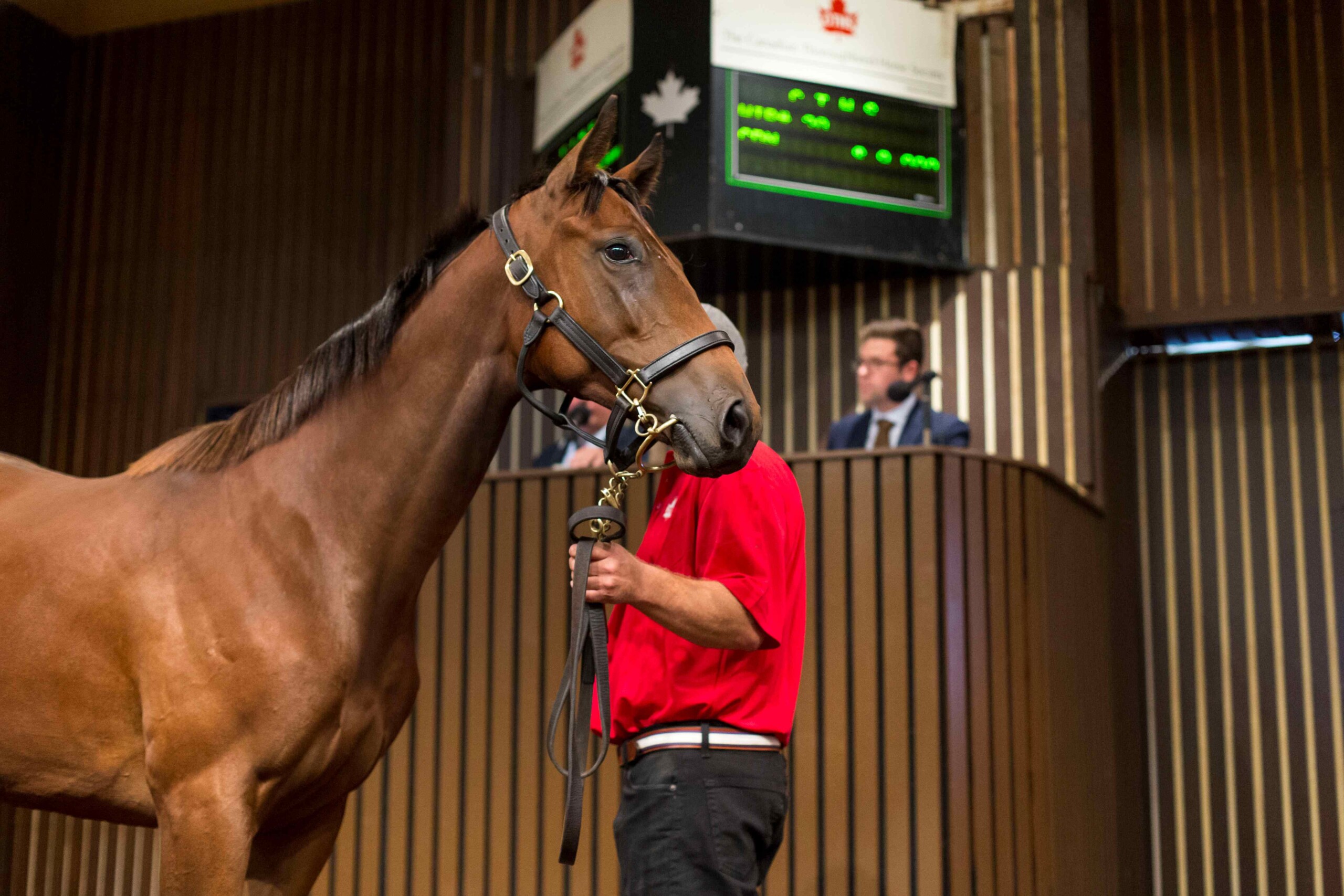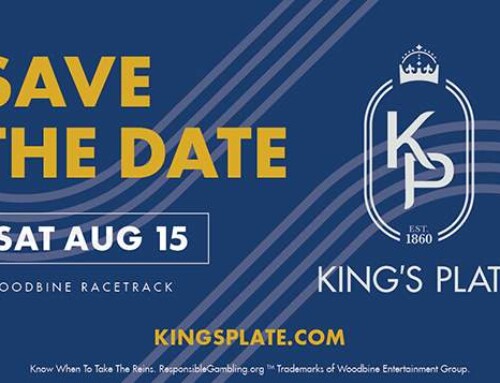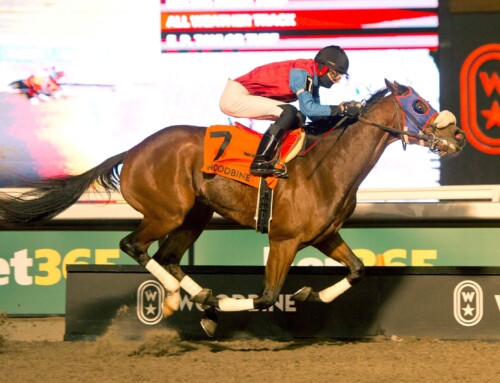by Dave Briggs / Ontario Racing
David Anderson believes the Canadian Premier Yearling Sale being held on Wednesday (Aug. 27) at the Woodbine Sales Pavilion is the antidote to a U.S. sales sector that “right now is out of control” and pricing the average horse owner out of the market.
“Historically, [the Canadian sale] has been one of the best value-buying sales in North America,” said Anderson, the president of both the national and Ontario branches of the Canadian Thoroughbred Horse Society (CTHS) that conducts the Canadian Premier sale. “The return on investment on these yearlings out of this sale is as good or better than any sale in North America.
“People that buy at that level have difficulty buying in the U.S. and finding value. The U.S. market right now is out of control.”
Case in point, the 104th Fasig-Tipton Saratoga Sale on Aug. 4 and 5 in Saratoga Springs, NY obliterated its record for gross, average and median. The sale topped $100 million in gross for the first time, up nearly 23 per cent from the previous record of over $82 million set last year. The average of $629,469 was up 18 per cent over the 2024 record of $533,506. Meanwhile, 25 yearlings sold for $1 million or more.
“I think that if people are serious about being in the racing business, they won’t find a better sale to buy a horse [than the CTHS sale]. You saw what happened in Saratoga. It was goofy,” said R. Glenn Sikura of Hill ‘n’ Dale Farms in King City, ON. Hill ‘n’ Dale is due to sell nearly 30 yearlings this year at the Canadian sale.
“I think that [the Canadian] sale has been remarkable, year in, year out,” Sikura said. “We’ve sold six horses that went on to win a million plus dollars. So, that gives you a pretty good indication. I’m sure Hill ‘n’ Dale Kentucky has done the same, but they’ve got the best of the best down there that they’re selling. So, I think this is a remarkable place to buy a horse. You have, as a buyer, far less competition than if you were trying to buy something in Kentucky. And you know the good news about this sale is you’re buying in Canadian dollars… those horses in Saratoga were really nice horses, but, wow, you saw their average, it was through the roof.”
There are 215 yearlings catalogued for Wednesday’s auction, which begins at 11 a.m. That’s down from 244 yearlings in last year’s catalogue, but Bernard McCormack of Cara Bloodstock – which is due to sell some 20 yearlings this year – said fewer available horses gives buyers a competitive advantage.
“There’s not that many in the foal crops,” McCormack said. “So, you know, these horses are going to win the money. That’s the bottom line.
Sikura agreed. “As a buyer, you’ve got less competition,” he said. “You’re paying in Canadian bucks, and you’re not competing against somebody who has a different tax code than you, for the most part.”
In recent years, the Canadian sale has been trending in the right direction. Last year, 244 yearlings were catalogued with 143 sold for a gross of $3,727,700 and an average of $26,297 that was up 10.6 per cent from the 2023 average of $23,778. The 2024 median of $19,000 was up 27 per cent from the 2023 median of $15,000.
“For what they cost and what they can earn, it might be in the top two or three sales,” McCormack said. “It’s maybe not Saratoga, maybe not Keeneland book one or two, but, you know, it’s right there.
“This is where a lot of our Ontario breeders like to sell. It’s a sale that’s on the improve. The last couple of years, the median and average have been going up.”
McCormack can also rhyme off many other reasons the Canadian sale is the place to buy.
“It’s Canada’s sale,” he said. “Given everything with the dollar [exchange rate], given everything with the border, given everything with how much money these horses can earn out of this sale, it’s a no-brainer in terms of giving it a hard look. I think the buyers, as we’ve seen in the sales so far this year down south, there’s fewer horses around, and these are the horses that are going to win the money. So, the best thing to do is get out and find them and grab them.”
BUY CANADIAN FEVER
Anderson highlighted the rise of Buy Canadian initiatives in response to the U.S. imposing tariffs on its northern neighbour.
“Given the tariff attacks on Canada, I think that a lot of Canadian buyers are probably looking to stay and buy here in Ontario this year and not go to the States,” Anderson said. “Our catalog numbers are down, which is really just a victim of our foal crop more than anything, but in terms of quality, I think it’s definitely the best catalog we’ve had in years, both through pedigree and individuals.”
Meanwhile, Anderson said he expects some U.S. buyers to take advantage of the exchange rate bonus.
“We’ve had quite a few inquiries from some American buyers looking at coming up to Canada and taking advantages of certainly the dollar and the value,” Anderson said. “We’re going to see some new faces walking around this year. They’ve already committed. Even if they don’t buy, as long as they’re bidders every little bit helps.”
Owner Frank Di Giulio, Jr. mostly breeds his own horses to race these days, but he said he’s bought from the Canadian sale in the past and he’s a fan of it.
“You’re buying in Canadian dollars,” Di Giulio, Jr. said. “If you’re going down to the States and you’re buying an Ontario-bred, you’re buying in U.S. dollars, and then you’ve got to ship them back up here. So, there are lots of reasons to want to buy out of the [Canadian] sale.”
BONUS PROGRAMS FOR ONTARIO HORSES
Beyond value, Anderson said there are many advantages of buying an Ontario yearling at the sale beyond those horses being eligible to Ontario-sired and/or Ontario-bred races run through Ontario Racing’s Thoroughbred Improvement Program (TIP).
“From the TIP perspective, we put in those new sales maiden races,” Anderson said. “I think the first couple were a big success, and hopefully that money will come back into the sale, as well.”
Di Giulio, Jr said the sale is, “a great place to buy a Canadian-bred and especially an Ontario-sired horse. If you find the right one, especially with Ontario-sired horses, you can do well with them if they can run, because you’ve got the three allowance conditions you can run in before you have to run wide open. And you’ve got other options as well, including the Heritage Series as a 3-year-old and you’ve got the yearling sales as a 2-, 3- and 4-year-old. So, there are lots of reasons to buy out of the sale. I am a fan of the sale, for sure.”
McCormack also touted the value of owning and racing an Ontario-bred horse.
“A lot of nice horses have graduated recently out of the sale, and the 2-year-old program with the extra races for the more precocious ones, is a better chance to get some opportunity without running against the real tough ones,” McCormack said. “There’s also the sale graduate races and then there’s the sales stakes and the Ontario sire stakes that support the sale, of course.”
Sikura said he recently won a race with an Ontario-bred and was pleasantly surprised with the bonus money.
“The bonuses are good for registered Ontario-bred horses that win races,” he said. “I won a race over the weekend, and I thought the purse was X, and even though I’ve been involved with [Ontario racing programs] for forever and a day, I said, ‘There must be a mistake.’ I forgot about the Ontario-bred bonus. It really adds up.”
Horses produced for the Ontario racing market also helps fill fields, which is essential for driving wagering that supports breed development programs.
“For Woodbine racing, for Canadian racing, [the sale] provides a lot of good, solid horses,” McCormack said. “They’re there. You just have to find them.”
Though, it’s important to note that there is no TIP Sales Credit Program available for this year’s sale.
SALE IS ESSENTIAL FOR ONTARIO BREEDERS
For Ontario horse breeders, the Canadian Premier Yearling Sale is extremely important. Most of them work – and pay bills – for a minimum of three years to just get to that one sale day when they can sell their product and recoup that investment.
“As a breeder in this game, you pay all the bills up front,” McCormack said. “That’s just the way it is, and you take all the ups and downs. So, this is payday for the breeders. Survival is having a good day at the sales and not all of them will sell.”
Anderson said they understand how important the sale is for breeders’ bottom lines.
“For the breeders, it’s always a nerve-wracking time of year for them because this is where they make 80 per cent of their revenue coming out of this sale,” Anderson said. “It’s something they rely on, and it’s our job at the CTHS to try and bring in as many buyers as we possibly can to support them and support our members.”
Sherry McLean, owner of Northern Dawn Stables in Hillsburgh, ON, is due to sell nearly 20 horses this year. The sale is essential to her bottom line. She said she is optimistic about the sale, but nervous considering how important it is to her operation.
“I have horses for every level of buyer, I really do, and they run,” McLean said. “They’re raised right. I just hope [buyers] can find something in the sale that they’re excited about… I know what my horses are. I know they’ll race. I think that’s important.”
Still, McLean said she is realistic about where the sale is positioned in the market.
“I don’t mind selling value for the dollar,” she said. “I kind of know where my horses sit… But let’s hope we have a good market, and we do well.”
Sikura said he is similarly bullish on Hill ‘n’ Dale’s consignment.
“I know for sure that I’ve got some really nice horses,” he said. “I’m really happy with the look of the consignment.”
Anderson said this year’s sale will attempt to build off gains made last year.
“[Last year] we started the sale a little bit earlier, and we really tried to move it along a little quicker than in the past, and tried to create some momentum,” he said. “Any good sale is all about momentum. And when a sale gets hot, it stays hot, and you want to keep it hot. Our goal [last year] was to be done by 6 p.m. and we were done at 5:45.”
Sikura said, “it’s a really good place to buy horses. There are 215 horses, and you can get through the catalog in a relatively good order. It’s not like Keeneland, where there’s 5,000 of them.”
In the end, Anderson said, “there’s a lot of optimism. I’ve heard a lot of people are looking forward to the sale and looking forward to buying.”




